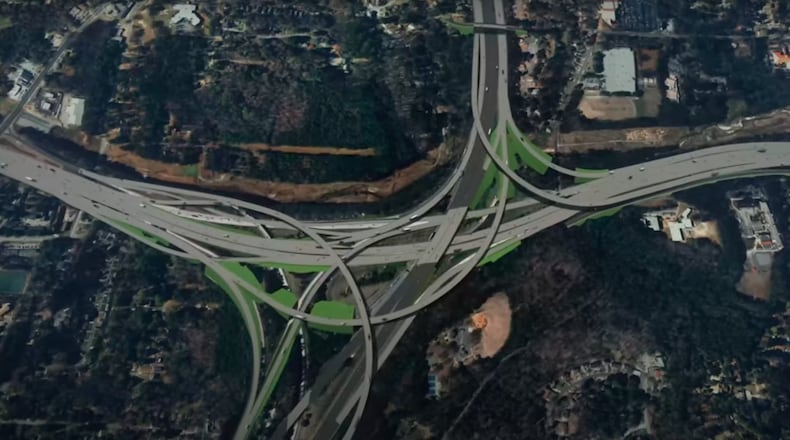It was the most expensive transportation project in state history, for all of 10 minutes.
The eye-popping $4.6 billion Ga. 400 express lane project grabbed headlines at last week’s State Transportation Board meeting, overshadowing the $1.2 billion rebuilding of the I-285 interchange at I-20 west of Atlanta, which was approved by the board just minutes before.
But the selection of a contractor for the interchange marks a big milestone for the Georgia Department of Transportation’s plans to alleviate one of the worst bottlenecks in the country. Part of a series of massive highway construction projects happening around metro Atlanta, the interchange is “one more piece of the puzzle” toward reducing congestion and speeding up commute times, Transportation Commissioner Russell McMurry said in an interview.
“There’s a bigger vision here,” McMurry said.
Georgia roads appear nine times on the American Transportation Research Institute’s top 100 truck bottlenecks list, and the I-285/I-20 west interchange is the country’s fifth-worst. The gridlock lengthens the travel time for trucks trying to quickly ferry goods to stores and increases the safety hazards to truckers and everyday commuters.
During peak times, the average speed at the west interchange was 36 miles per hour last year, according to data from the research institute. The redesign is intended to speed up traffic flow and improve safety.
On I-20, the interchange project work starts at the Factory Shoals Road overpass in Cobb County and continues east to Hamilton E. Holmes Drive in Atlanta. On I-285, the work will start at Martin Luther King Jr. Drive and go north to Donald Lee Hollowell Parkway.
Among the changes to expect:
- Roughly six miles of additional lanes on I-20 and two miles of additional lanes on I-285;
- A new collector-distributor lane — parallel lanes designed for merging traffic — from the interchange to Fulton Industrial Boulevard;
- The construction of two-lane ramps within the interchange;
- Moving exits from the left lanes to the right;
- Replacing several bridges on I-20, including over the Chattahoochee River;
- Replacing the I-20 bridge over I-285.
Credit: Courtesy of GDOT
Credit: Courtesy of GDOT
The project doesn’t include a transit component, unlike the Ga. 400 express lanes, which feature new MARTA stations to support bus rapid transit.
Improved traffic times on I-20 could benefit riders along certain bus routes, however. The Atlanta-Region Transit Link Authority operates two Xpress commuter buses along I-20 and CobbLinc operates two buses that run from MARTA’s H.E. Holmes station along I-20. MARTA also operates a route to Six Flags over Georgia along the affected section of I-20.
The firm hired for the project, Legacy Infrastructure Contractors, estimated its designs could improve average traffic speeds by 10% during rush hour. But before any potential improvements can be realized, drivers will have to contend with a lengthy construction timetable. The work is projected to begin next year, and Legacy plans to complete it in stages, starting with the furthest west section of I-20. Construction should wrap up in the fall of 2030.
It will overlap with the $685.6 million project rebuilding the I-20 and I-285 interchange east of Atlanta. Construction on that interchange, another of the worst bottlenecks in the country, began in 2023 and is projected to be complete in 2026.
About the Author
Keep Reading
The Latest
Featured


